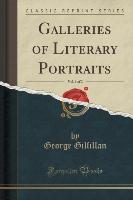- Start
- Galleries of Literary Portraits, Vol. 1 of 2 (Classic Reprint)
Galleries of Literary Portraits, Vol. 1 of 2 (Classic Reprint)
Angebote / Angebote:
Excerpt from Galleries of Literary Portraits, Vol. 1 of 2
Æschylus "Prometheus Vinctus" has been lately translated into English verse by Professor Blackie. Without much ease, or grace, or melody, his translation is very spirited, and gives a more vivid idea of this great old poet's rugged energy and rapturous enthusiasm, than any other verse rendering we have read. But we are mistaken if the mere English reader does not derive a better notion of Æchylus still from the old prose versions. Best of all were such a translation as Dr John Carlyle has executed of Dante, distinguished at once by correctness and energy.
The sympathy which this poet felt for the ancient mythology of his country, for gods to whom Jove was but a beardless boy, was strictly a fellow-feeling. He was a Titan among men, and we fancy him, sick of the present, and reverting to the past, tired of the elegant mannikins around, and stretching forth his arms to grasp the bulky shades of a bygone era. He had been a soldier, too, and this had probably infused into his mind a certain contempt for mankind as they were. He that mingles and takes a part in a battle-field, would require to be more than mortal to escape this feeling, seeing there, as he must, man writhen into all varieties of painful, shameful, despicable, and horrible attitudes. It was, indeed, at Marathon, Salamis, and perhaps Plataea, that he mingled in warfare, but the details of even these world-famous fights of freedom must have been as mean and disgusting as those of Borodino or Austerlitz. From man, Æschylus turned pensively and proudly to the gods, first to the lower circle of Jove and Apollo, but at last, with deeper reverence and fonder love, to that elder family whom they had supplanted. Of that fallen house he became and continued the laureate, till the boy Keats, with hectic heat and unearthly beauty, sang "Hyperion."
More strictly speaking, Æschylus was the poet of Destiny, Duty, and other great abstractions. He saw these towering over Olympus, reposing in his sleeping Furies, and shining like stars through the shadows of his gods.
About the Publisher
Forgotten Books publishes hundreds of thousands of rare and classic books. Find more at www.forgottenbooks.com
This book is a reproduction of an important historical work. Forgotten Books uses state-of-the-art technology to digitally reconstruct the work, preserving the original format whilst repairing imperfections present in the aged copy. In rare cases, an imperfection in the original, such as a blemish or missing page, may be replicated in our edition. We do, however, repair the vast majority of imperfections successfully, any imperfections that remain are intentionally left to preserve the state of such historical works.
Folgt in ca. 5 Arbeitstagen
